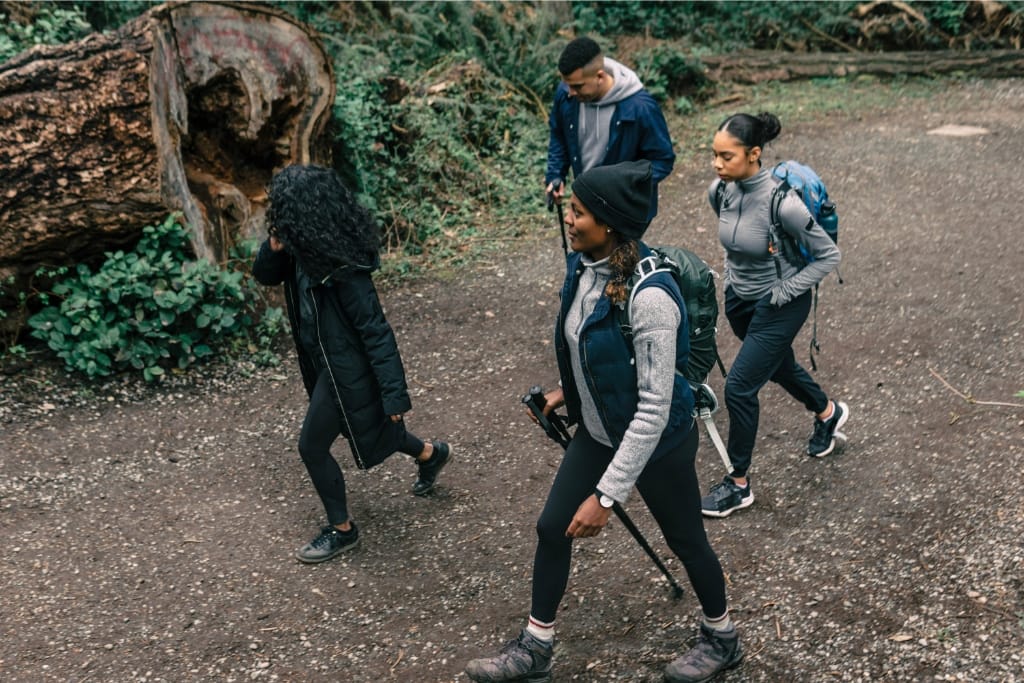Exploring the great outdoors through hiking can be an incredibly rewarding experience, offering breathtaking views, fresh air, and a chance to reconnect with nature.
However, as exciting as it is, setting out unprepared or making common mistakes can quickly turn an adventure into a challenge.
Whether you're new to hiking or looking to refresh your knowledge, understanding these frequent pitfalls and how to overcome them is key to ensuring a safe and enjoyable trek.
Don't miss the tips ahead to start your hiking journey on the right foot!
1)) Poor Route Planning
Failing to plan your hiking route thoroughly can lead to unnecessary risks and stress during your trip.
Beginners often underestimate the importance of researching trail difficulty, length, and elevation changes, which can result in exhaustion or even putting themselves in dangerous situations.
It's essential to familiarize yourself with the specifics of your chosen trail, including weather conditions, landmarks, and potential hazards.
Checking reliable maps, guides, or local recommendations can save you from surprises.
By ensuring your route matches your fitness level and preparedness, your hike will be safer and much more enjoyable.
2)) Overpacking Gear
Carrying too much gear can quickly turn your hiking adventure into an exhausting ordeal.
Overpacking not only weighs you down but also increases the likelihood of discomfort or injury, such as strained muscles or joint pain.
Beginners may feel tempted to bring items "just in case," but it's crucial to focus on essentials like proper footwear, water, food, navigation tools, and weather-appropriate clothing.
Everything else should be assessed for necessity and practicality. Traveling light with only what you truly need will keep you more agile and allow you to enjoy the hike without unnecessary strain.
3)) Underpacking Essentials
Leaving behind essential items can lead to serious challenges on the trail, especially in unexpected situations.
Beginners often underestimate the importance of packing necessities like sufficient water, snacks, first aid supplies, and layers to prepare for changing weather.
Being underprepared might result in dehydration, hunger, or an inability to handle emergencies, which can put the entire hike at risk.
It's vital to create a checklist before heading out, ensuring you have everything required for safety and comfort.
By packing thoughtfully and including essential gear, you can tackle your hike with greater confidence and peace of mind.
4)) Ignoring Weather Forecasts
Failing to check the weather forecast before heading out can turn a pleasant hike into a hazardous experience.
Sudden weather changes, such as rain, extreme heat, or strong winds, can create dangerous trail conditions and significantly affect visibility or navigation.
Beginners might assume favorable conditions will hold throughout the day, but nature can be unpredictable.
It's crucial to review forecasts thoroughly and prepare for possible weather shifts by carrying appropriate gear, such as rain jackets or sun protection.
Staying informed about weather conditions ensures you're ready to adapt and keeps your hike both safe and enjoyable.
5)) Wearing Inappropriate Footwear
Wearing unsuitable footwear can lead to discomfort, and injuries, or even cut a hike short altogether.
Beginners often make the mistake of choosing shoes that are not designed for hiking, such as casual sneakers or sandals, which lack the support and grip required for uneven or rugged terrain.
Proper hiking footwear, like sturdy boots or trail shoes with good traction, provides the stability and protection needed to handle various trail conditions.
Ensuring your footwear fits well and is broken in before your hike can also prevent painful blisters or sore feet.
With the right shoes, you'll feel more secure and ready to tackle the trail with confidence.
6)) Lack Of Hydration
Failing to stay properly hydrated while hiking can have serious consequences, ranging from fatigue to life-threatening dehydration.
Beginners might underestimate how much water they need, especially on longer or more strenuous trails.
Sweating during physical activity causes the body to lose essential fluids and electrolytes, which must be replenished to maintain energy levels and prevent heat-related illnesses.
It's vital to carry an adequate supply of water or hydration aids, such as electrolyte tablets, and to drink regularly throughout the hike, not just when you feel thirsty.
Staying attentive to your hydration needs will keep you energized and ready to enjoy the trail from start to finish.
7)) Forgetting Navigation Tools
Neglecting to bring proper navigation tools on a hike can lead to confusion and even getting lost, particularly in unfamiliar or remote areas.
Beginners may assume that marked trails or mobile phone GPS will suffice, but technology can fail due to poor signal or battery issues.
Essential tools such as a physical map, compass, or GPS device designed for outdoor use can make a significant difference in helping you stay on track.
Learning how to use these tools beforehand is equally crucial to ensuring you can confidently find your way if needed.
By equipping yourself with reliable navigation aids, you can hike with peace of mind and focus on enjoying the scenery.
8)) Starting Too Late In The Day
Starting a hike too late in the day can create multiple challenges, particularly when daylight becomes limited.
Beginners might underestimate how long a trail will take to complete or overestimate their ability to hike quickly.
This miscalculation can leave hikers navigating in the dark, increasing the risk of accidents or getting lost.
Limited daylight also reduces visibility, making it harder to spot trail markers or hazards like roots and rocks.
Planning an early start not only allows plenty of time to complete the hike safely but also ensures you can enjoy the scenery under ideal lighting conditions.
With a well-timed departure, your hike will be safer, more enjoyable, and less rushed.
9)) Not Pacing Properly
Maintaining an appropriate pace during a hike is essential to sustain energy and avoid exhaustion.
Beginners may start too fast, underestimate the demands of the trail, or go too slowly, risking delays and running out of time to finish safely.
An inconsistent pace can also put unnecessary strain on muscles and joints, increasing the likelihood of injury.
By setting a steady, manageable pace and taking periodic breaks, hikers can conserve their energy and enjoy the experience without feeling overwhelmed or fatigued.
Pacing yourself thoughtfully ensures you complete the hike comfortably and with a sense of accomplishment.
10)) Skipping First Aid Supplies
Skipping first aid supplies can turn a minor mishap into a serious problem during a hike, particularly in remote areas where help might not be readily available.
Accidents such as cuts, scrapes, blisters, or sprains are common on trails and can quickly become debilitating without the proper tools to address them.
A basic first aid kit should include essentials like bandages, antiseptic wipes, blister treatments, and pain relievers to handle most trail-related injuries.
Including items like tweezers for splinters or a small roll of medical tape can be invaluable.
By carrying a well-stocked first aid kit, you are prepared to manage unexpected emergencies and hike with greater peace of mind.
11)) Disregarding Wildlife Precautions
Disregarding wildlife precautions while hiking can lead to dangerous encounters and disturb the natural habitat.
Many hikers underestimate the importance of understanding the local wildlife and their potential behaviors, which can result in conflicts with animals, some of which may be territorial or defensive when surprised.
Properly storing food and trash in odor-proof containers reduces the likelihood of attracting animals like bears or raccoons.
Keeping a safe distance from all wildlife, paying attention to trail signage, and avoiding feeding animals are critical practices that protect both hikers and creatures alike.
By being respectful and prepared, you can ensure your hike is safer and minimize your impact on the environment.
12)) Underestimating Trail Difficulty
Underestimating trail difficulty is a common mistake that can quickly turn an enjoyable hike into an exhausting or dangerous experience.
Beginners often misjudge factors such as elevation gain, terrain challenges, or the physical demands of longer trails.
Without proper preparation or research, hikers may find themselves ill-equipped, lacking essential gear, or physically unprepared for the trail’s demands.
Taking time to study the trail’s description, reviews, and difficulty rating, as well as assessing your fitness level, is critical for safety and enjoyment.
By accurately evaluating the trail and preparing accordingly, you can ensure a rewarding experience that matches your abilities.
Conclusion
Hiking is a fulfilling and enriching experience that allows us to connect with nature and challenge ourselves both physically and mentally.
By staying mindful of proper preparation and avoiding common pitfalls, you can ensure that your time on the trail is safe, enjoyable, and memorable.
Whether it's starting your hike early, pacing yourself wisely, or respecting wildlife and trail conditions, these thoughtful practices enhance your adventure while preserving the beauty of the natural environments we cherish.
With careful planning and awareness, every hike can become an opportunity for growth, discovery, and lasting joy.
Download Our Free E-book!







